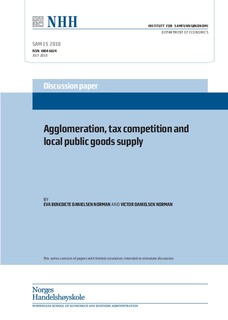Agglomeration, tax competition and local public goods supply
Working paper
Permanent lenke
http://hdl.handle.net/11250/163228Utgivelsesdato
2010-07Metadata
Vis full innførselSamlinger
- Discussion papers (SAM) [657]
Sammendrag
In this paper we develop a framework for studying tax competition and local
public goods supply in a setting where real and fiscal externalities interact with local
democracy. We use the framework (a) to analyse if there is any reason to believe that local autonomy generally will give a tax race to the bottom (there is not), and (b) to look more closely at possible sources of oversupply or undersupply of publicly
provided goods in a setting where local democracies compete for people. We identify
two potential sources – the relationship between individual mobility and willingness to
pay for publicly provided goods, and the mobility distribution of individuals (i.e. the
distribution of individuals over residential preferences). The two could reinforce each
other in a local democracy if the majority of the residents in a community are relatively
mobile (the “American” case), while they would pull in opposite directions if the
majority of residents are relatively immobile (the “European” case).
Utgiver
Norwegian School of Economics and Business Administration. Department of EconomicsSerie
Discussion paper2010:15
